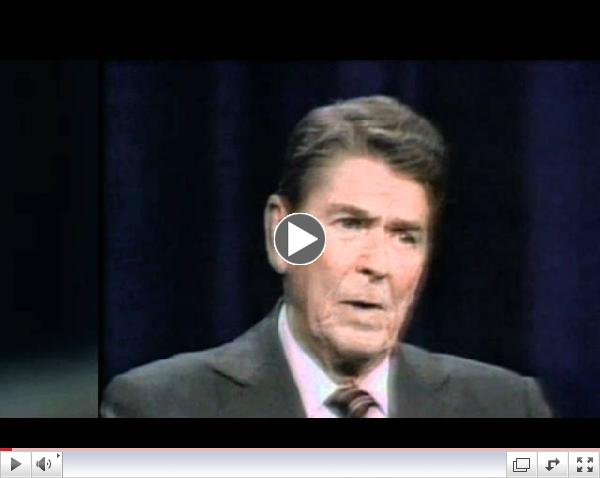In today's selection—from Social: Why Our Brains Are Wired To Connect by Matthew Lieberman. Our reactions to things are highly influenced by the reactions of those around us:
"On
October 21, 1984, President Ronald Reagan and his challenger, former
Vice President Walter Mondale, held the second of two nationally
televised presidential debates in the run-up to the presidential
election. President Reagan remained popular, but his support was
softening in light of growing concerns about his age. His poor
performance in the previous debate, three weeks earlier, had opened the
door to questions about his mental fitness. If reelected, Reagan would
become the oldest sitting president in U.S. history (he was
seventy-three at the time of the debate). Reagan's performance at this
final debate is frequently cited as a turning point in the election,
when Reagan's popular support
solidified, contributing to the largest electoral landslide in history.
 |
1984: Reagan jokes about Mondale's youth
|
"How
did Reagan demonstrate that he was still in command of all of his
faculties? Did he display his erudition on the current issues of the
day? Did he play to his own strengths by vigorously attacking Mondale on
issues like foreign policy or the tax code? No. It was Reagan's comedic
timing that allowed him to carry the day. Reagan delivered a series of
prefabricated one-liners with aplomb, regained his momentum, and never
looked back. The most notable zinger came when the moderator asked him
if age was a concern in the election. Reagan famously replied, 'I will
not make age an issue of this campaign. I am not going to exploit, for
political purposes, my opponent's youth and inexperience.' Mondale, not
exactly a spring chicken at fifty-six, later commented that he knew at
that very moment he had lost the campaign.
"That
night, nearly 70 million Americans watched the debate and came away
convinced that the Gipper still had his mojo. Any fears people had that
President Reagan had slipped were assuaged. But how we as a nation
reached this conclusion on that night is surprising. Reagan himself
didn't change our minds about him. It took a few hundred people in the
audience to change our minds. It was their laughter coming over the
airwaves that moved the needle on how we viewed Reagan.
"Social psychologist Steve Fein asked people who had not seen the debate to watch a recording of it in one of two ways. Some individuals saw clips of the debate and the audience's reaction as it was played on live television, while others saw the debate without being able to hear the audience's reactions. In both cases, viewers heard the president deliver the same lines. Viewers who heard the audience laughter rated Reagan as having outperformed Mondale. However, those who did not hear the laughing responded quite differently; these viewers indicated a decisive victory for Vice President Mondale. In other words, we didn't think Reagan was funny because Reagan was funny. We were influenced by innocuous social cues.
"Imagine watching the debate yourself (or maybe you did watch it). Would you think audience laughter could influence your evaluation of the candidates? Would you be influenced by those graphs that CNN shows at the bottom of the screen during today's debates to indicate how a handful of people are responding to the candidates, moment by moment? Would it sway your vote? Most of us, I suspect, would say no. The notion that our decision about who should be the president of our nation could be altered by the responses of a few people in the audience violates our theory of human nature, our sense of 'who we are.' We like to think of ourselves as independent-minded and immune to this sort of influence. Yet we would be wrong. Every day other influence us in countless ways that we do not recognize or appreciate."
Author: Matthew D. Lieberman
Title: Social: Why Our Brains Are Wired To Connect
Publisher: CROWN a division of Random House
Date: Copyright 2013 by Matthew D. Lieberman
Pages: 5-7
|
No comments:
Post a Comment